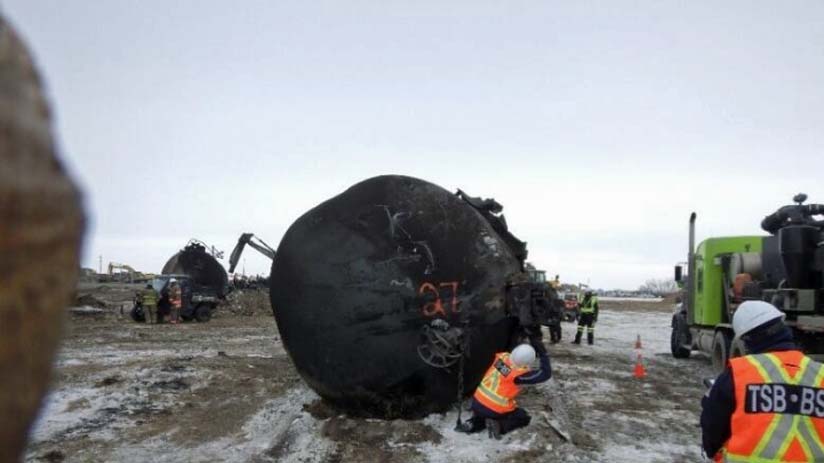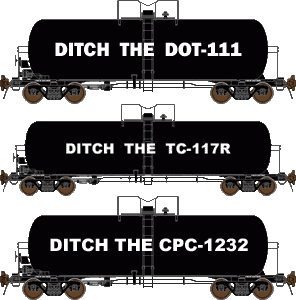
 Guernsey
Saskatchewan - The Transportation Safety Board of Canada (TSB) says it has not found any mechanical defects that could account for the derailment of a CP
oil train last week near the small Saskatchewan hamlet of Guernsey, but it's taking a close look at the tank cars involved in the incident.
Guernsey
Saskatchewan - The Transportation Safety Board of Canada (TSB) says it has not found any mechanical defects that could account for the derailment of a CP
oil train last week near the small Saskatchewan hamlet of Guernsey, but it's taking a close look at the tank cars involved in the incident.
The TSB issued a preliminary report on the 6 Feb 2020 crash on Friday morning.
None of the findings are final.
"A review of the locomotive event recorder download determined that the train was handled in accordance with regulatory and company requirements,"
the TSB said in its preliminary update.
The finding about a lack of mechanical defects referred only to the train and did not refer to the track, a TSB spokesperson confirmed.
It also found that of the 32 tank cars that derailed, 19 were involved in the blaze that shut down the nearby highway and prompted the voluntary evacuation of
about 85 people.
It's not clear how many, or if any, tanks lost their entire loads.
Transport Canada (TC) has touted the newly-built cars involved in last week's crash, dubbed TC-117s, as being safer than the tanks used in the explosive
Lake Megantic rail disaster of 2013.
Questions About Containment Integrity and Fire Resistance
Last week's derailment was the second to happen near Guernsey in less than two months.
A CP oil train crashed on the other side of Guernsey on 9 Dec 2019 with 19 of the 33 derailed tank cars losing their entire loads of oil.
The tanks involved in that crash were retrofitted cars, TC-117Rs, which have a slightly less thick hull than the new TC-117s.
CP does not own the tank cars but rather leases them from a provider.
In its release about the most recent derailment, the TSB said there is "significant industry interest in documenting the performance of the new TC-117
tank cars," particularly in terms of "containment integrity and fire resistance."
The fire from last week's train crash burned for at least a day and a half.
The eastbound train, which was carrying diluted bitumen owned by Conoco Phillips, had left Rosyth, Alberta, and was headed for Stroud, Oklahoma.
It derailed about 2.4 kilometres west of Guernsey.
A Texas-based company called Trinity Rail previously confirmed to CBC News that it manufactured the tank cars involved in last Thursday's crash and is
"proactively monitoring the situation."
While the TSB said the amount of oil released remains undetermined, the Saskatchewan government has said an estimated 1.2 million litres of oil spilled, citing
CP as its source.
That's just short of the amount spilled in the December derailment.
Slower Speed in 2nd Crash
According to the TSB, the train that derailed in December was travelling at about 75 kilometres an hour, which is the speed limit on that section of CP's
line.
But last Thursday's train was travelling more slowly, at around 67 kilometres an hour.
Three TSB investigators are probing the causes of the crash.
"Each tank car must be cleaned, purged, and staged prior to inspection," the TSB said.
"As of Wednesday, about 17 of the derailed cars have been examined, with several cars exhibiting breaches."
The train was carrying a total of 104 tank cars.
Saskatchewan Minister Talks Pipelines and Rail Safety
The two derailments have prompted many people to advocate for more pipelines.
In a news conference Friday about school bus safety and the blockades that have crippled Canada's rail service, Saskatchewan's minister of highways and
infrastructure, Greg Ottenbreit, made a brief comment that touched on the topic of pipelines and railway safety.
"Saskatchewan is a landlocked province but Saskatchewan is also a gateway to the world," he said.
"And I think a lot of my fellow ministers can connect with those comments. We will continue to advocate for an uninhibited tidewater access, also pipeline
access, which will lead to rail safety and capacity."
Guy Quenneville.
provisions in Section 29 of the Canadian
Copyright Modernization Act.

